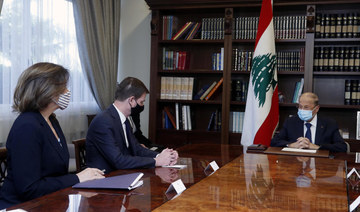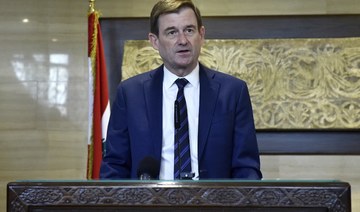BEIRUT: The US undersecretary of state for political affairs, David Hale, has issued a warning against “those who continue to obstruct progress on the reform agenda.”
He said that they “jeopardize their relationship with the US and our partners and open themselves up to punitive actions,” adding: “Those who facilitate progress can be assured of our strong support.”
Hale’s statement came after his meeting on Thursday with Lebanese President Michel Aoun.
The political disagreements resulted in the failure of the designated prime minister, Saad Hariri, to form a rescue government of non-partisan specialists to implement reforms demanded by the international community.
President Aoun’s team and his supporters object to the government lineup presented by Hariri last December. Aoun and his political team, represented by the Free Patriotic Movement (FPM), are demanding that they have the power to name Christian ministers in the government and to have the blocking vote. Hezbollah, which supports a techno-political government, champions some of these demands.
The US administration had previously imposed sanctions on FPM leader Gebran Bassil on charges related to corruption.
Hale stressed that he came to Lebanon “at the request of Secretary Blinken to underscore the Biden administration’s continued commitment to the Lebanese people and our shared desire for stability and prosperity in Lebanon.”
Hale reiterated his condemnation of the performance of the ruling authority.
“The Lebanese people are clearly suffering. They are suffering because Lebanese leaders have failed to meet their responsibility to put the country’s interests first and to address the mounting socio-economic problems,” he said.
Hale referred to his two previous visits to Lebanon, which were in December 2019 and August 2020. He said: “I heard then an unmistakable call for change from Lebanese from all backgrounds. These demands are universal: For transparency, accountability, and an end to the endemic corruption and mismanagement that have caused such hardship.
“If these demands had been met, Lebanon would be on the road to fulfilling its tremendous potential. Yet today, there has been very little progress. But it’s not too late.”
Hale renewed his call on Lebanon’s leaders “to show sufficient flexibility to form a government that is willing and capable of reversing the collapse underway.”
He said: “The time to build a government, not block it, is now. The time to build a government is now. The time for comprehensive reform is now. And America and the international community are ready to help. But we cannot help, as I said yesterday, without a Lebanese partner.”
Hale specifically criticized Hezbollah: “Hezbollah’s accumulation of dangerous weapons, smuggling, and other illicit and corrupt activities undermine legitimate state institutions.”
He added: “They rob the Lebanese of the ability to build a peaceful and prosperous country. And it is Iran that is fueling and financing this challenge to the state and this distortion of Lebanese political life.
“This brings me to America’s renewed negotiations over Iran’s nuclear program. A mutual return to compliance with the Iran nuclear deal is in our interest and in the interest of regional stability, but it would only be the beginning of our work. As we address the other elements of Iran’s destabilizing behavior, America will not abandon our interests and our friends here in Lebanon.”
Hale, who is described in Lebanon as the godfather of the framework agreement for negotiations on demarcating Lebanon’s southern borders with Israel, stressed that “America stands ready to facilitate negotiations on the maritime boundary between Lebanon and Israel on the basis on which we initiated these discussions.”
Hale’s insistence on facilitating negotiations with Israel “on the basis on which we initiated” came as a response to Lebanon’s demand during the 2020 Lebanese-Israeli technical negotiations to amend the area it expects to reclaim due to a calculating error. This amendment will include 2,290 sq. km instead of an area of 860 sq. km. This expansion depended on an effort by the Lebanese Army in 2019 to demarcate the maritime borders.
Lebanon drew up a decree to amend this area to submit it to the UN.
This decree has yet to be signed by Aoun, pending the approval of the cabinet. Caretaker Prime Minister Hassan Diab is refusing to hold a cabinet session due to its illegality.
Following Hale’s statement, Aoun stressed “the importance of continuing negotiations on demarcating the maritime borders between Lebanon and Israel and fulfilling America’s role as an honest and just mediator.”
He said: “Lebanon has the right to develop its position according to its interest, in line with the international law, and in accordance with constitutional principles.”
Aoun called for “the appointment of international experts to demarcate the line and the commitment to refraining from any exploration work in the Karish field and in the adjacent waters.”
He stressed that he would not abandon “the sovereignty, rights, and interests of Lebanon” and would “make every effort to ensure that the demarcation of the borders is a subject of consensus among the Lebanese and not a subject of division, with the aim of strengthening Lebanon’s position in the negotiations.”
Hale’s meeting with Lebanese Army commander Gen. Joseph Aoun focused on “the extent to which the army was affected by the approved spending rationalization decision and its impact on the army’s performance of the great tasks entrusted to it.”
Hale’s meetings in Beirut coincided with the visit of Hariri to Moscow. The Kremlin announced on Thursday that a phone call took place between President Vladimir Putin and Hariri, who was present at the Russian Foreign Ministry. The call lasted 50 minutes.
The Kremlin’s statement said that Hariri briefed Putin on internal developments and the initial measures to form a government and overcome the economic crisis. Russia affirmed its position in support of Lebanon’s sovereignty, independence, and territorial integrity.
A source among the Lebanese delegation to Moscow told Arab News that the call between Putin and Hariri was “excellent with regard to the government crisis, and it stressed that the government should be formed as soon as possible.”


























